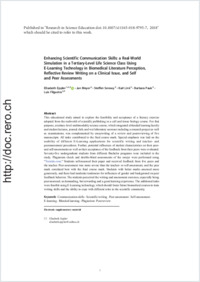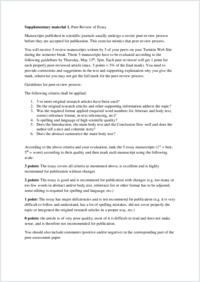Enhancing scientific communication skills: a real-world simulation in a tertiary-level life science class using e-learning technology in biomedical literature perception, reflective review writing on a clinical issue, and self and peer assessments
- Eppler, Elisabeth Department of Biomedicine, University of Basel, Switzerland - School of Human Sciences, The University of Western Australia, Perth, Australia - Department of Neuroradiology, University Hospital of Magdeburg, Germany
- Meyer, Jan School of Human Sciences, The University of Western Australia, Perth, Australia
- Serowy, Steffen Department of Neuroradiology, University Hospital of Magdeburg, Germany
- Link, Karl Anatomy, Department of Medicine, University of Fribourg, Switzerland
- Pauk, Barbara European Languages and Studies, School of Humanities, The University of Western Australia, Perth, Australia
- Filgueira, Luis School of Human Sciences, The University of Western Australia, Perth, Australia - Anatomy, Department of Medicine, University of Fribourg, Switzerland
-
13.12.2018
Published in:
- Research in Science Education. - 2021, vol. 51, no. 2, p. 277-299
Education
Communication skills
Scientific writing
Peer assessment
Self-assessment
E-learning
Blended learning
Plagiarism
Peer review
English
This educational study aimed to explore the feasibility and acceptance of a literacy exercise adopted from the realworld of scientific publishing in a cell and tissue biology course. For that purpose, a tertiary-level multimodality science course, which integrated a blended learning faculty and student lectures, journal club, and wet laboratory sessions including a research project as well as examinations, was complemented by essaywriting of a review and peerreviewing of five manuscripts. All tasks contributed to the final course mark. Special emphasis was laid on the usability of different E-Learning applications for scientific writing and teacher- and peerassessment procedures. Further, potential influences of student characteristics on their peerand self-assessments as well as their acceptance of the feedback from their peers were evaluated. Seventy-five undergraduate students from different Bachelor programs were included in the study. Plagiarism check and double-blind assessments of the essays were performed using “Turnitin.com.” Students self- assessed their paper and received feedback from five peers and the teacher. Peer assessment was more severe than the teacher- or self-assessment, and the peer mark correlated best with the final course mark. Students with better marks assessed more generously, and there had moderate tendencies for influences of gender and background on peer feedback behavior. The students perceived the writing and assessment exercises, especially being peer-assessed, as demanding, but rewarding and a great learning experience. The additional tasks were feasible using E-Learning technology, which should foster future biomedical courses to train writing skills and the ability to cope with different roles in the scientific community.
- Faculty
- Faculté des sciences et de médecine
- Department
- Département de Médecine
- Language
-
- English
- Classification
- Medicine
- License
-
License undefined
- Identifiers
-
- RERO DOC 323922
- DOI 10.1007/s11165-018-9795-7
- Persistent URL
- https://folia.unifr.ch/unifr/documents/307268
Other files
Statistics
Document views: 135
File downloads:
- pdf: 425
- Supplementary material: 174

